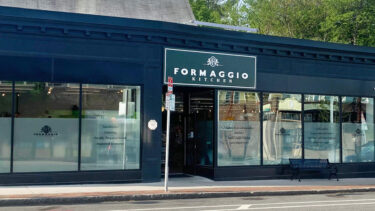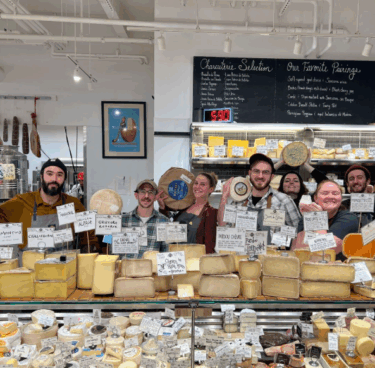A Look at How the RCS Grocery Growth Bundle is Solving Real-World Challenges in Specialty Grocery Stores

How is modern point-of-sale technology transforming the landscape for specialty grocery stores—those delightful shops filled with artisan cheeses, small-batch chocolates, and carefully curated provisions? To highlight what is possible, we examined how NCR Counterpoint assists stores similar to Boston’s renowned Formaggio Kitchen, which manages hundreds of rotating products across multiple locations while overseeing everything from deli counters to nationwide shipping. Here’s what we discovered about the specific challenges specialty retailers face—and how the right technology can address them
The Inventory Puzzle: Tracking What Matters
“How does a specialty market even begin managing thousands of products that are constantly changing?” Inventory at a specialty store includes a dizzying array of cheeses, charcuterie, wines, and other unique items that define these shops
The answer lies in robust inventory management that goes beyond simple stock counts. We’re talking about tracking expiration dates on perishable items, managing batch lots for artisan products, and setting up automatic reordering for customer favorites. For a store like Formaggio Kitchen, which rotates through hundreds of specialty items, this means significantly reduced inventory shrinkage, improved stock accuracy, and the confidence that bestsellers never disappear from the shelves when customers come looking.
The Scale Question: Pricing by the Pound
Then there’s the practical matter of weight-based sales. “What about all those products sold by weight—cheese, cured meats, fresh bread?”
This is where integrated scales and barcode labeling become essential. Staff can weigh a wedge of aged Gruyère or a chunk of mortadella, and the system instantly generates accurate pricing labels right at the counter. At busy deli and bakery stations, this keeps checkout moving quickly while ensuring customers get exactly what they pay for. The result? Consistent pricing, fewer errors, and most importantly, customer trust.
Beyond the Counter: Catering and Special Orders
Many specialty grocery stores have expanded into prepared foods and catering—a natural evolution that brings its own operational complexity. Formaggio Kitchen’s Boston-area locations run full kitchens alongside their retail operations.
“How do you keep track of everything from a quick sandwich order to a catering platter for fifty people?” The answer is having special orders, customer accounts, and loyalty profiles unified in one platform. This seamless integration means orders flow smoothly from initial request through preparation to pickup or delivery, keeping operations organized while delighting customers who return again and again.
When Technology Fails: The Always-On Safety Net
Here’s a scenario every retailer dreads: the internet goes down during your busiest Saturday afternoon. This is a common issue that can happen, thankfully not too often, but when it does, you need a plan of action.
“What happens when the network crashes during peak hours?”
With Always-On technology, transactions simply continue. For high-volume specialty stores, this means uninterrupted service during busy weekends, holidays, or that inevitable moment when the internet provider has “unexpected outages.” No lost sales. No frustrated customers waiting while you frantically reboot routers.
The Data Advantage: Knowing Your Business
One of the most powerful aspects of modern POS systems is what happens behind the scenes with analytics. Through advanced dashboards, retailers can discover which cheeses fly off the shelves in winter versus summer, track wine sales patterns across different locations, and forecast catering demand based on historical data.
This isn’t just interesting information—it’s the foundation for data-driven decisions that maximize profit margins and eliminate over-ordering on products that don’t move. For specialty retailers operating on thin margins, this intelligence is invaluable.
Expanding Your Reach: Online and Beyond
Today’s specialty food customers expect a variety of options. Many want to order online and have artisan products shipped anywhere in the country. Formaggio Kitchen does exactly this through its website, which raises an important question about inventory management.
With integrated eCommerce, inventory stays synchronized across all channels—online and in-store. That means no double entry, fewer disappointing stockouts, and a consistent brand experience whether customers shop in person or from across the country.
Taking the Store Mobile
“What about selling outside the physical store?” We are specifically referring to tasting parties, pop-up events, and farmers’ markets that help specialty retailers build community and expand their reach.
Mobile POS capabilities allow staff to process payments anywhere while maintaining a real-time connection to store inventory. This extends the brand beyond the shop’s four walls while keeping all sales data unified in one system, eliminating the need for separate tracking or reconciliation.
The People Part: Managing Staff
Specialty grocery store often means multiple locations and a mix of full-time, part-time, and seasonal workers. Labor management features simplify tracking hours, managing commissions for knowledgeable staff, and setting appropriate permissions for different roles.
The benefit isn’t just saving time on scheduling and payroll—it’s also improving security and ensuring that your most experienced staff members have the tools and access they need. At the same time, seasonal workers operate within appropriate boundaries.
Promotions and Compliance: Staying Legal
From holiday wine discounts to managing bottle deposits in states that require them, specialty retailers face complex pricing rules and compliance requirements. The right POS system automates these details, making it easy to run promotions that drive sales while meeting local regulations—without staff needing to remember which rules apply in each location.
Closing the Loop: Accounting Integration
Finally, there’s the back-office reality of bookkeeping. With accounting integrations, sales data flows directly into financial systems, eliminating the need for manual entry. For busy shop owners, this means less time crunching numbers in spreadsheets and more time doing what they love—curating exceptional products and building meaningful relationships with customers.
The Bottom Line
Specialty food retail is a complex and demanding field that requires balancing artisanal sensibility with operational excellence. The right POS system—like NCR Counterpoint—doesn’t just process transactions. It becomes the central nervous system that helps passionate retailers manage inventory, serve customers efficiently, expand their reach, and ultimately spend more time on what matters most: sharing exceptional food with their communities.

